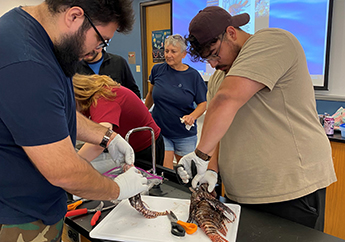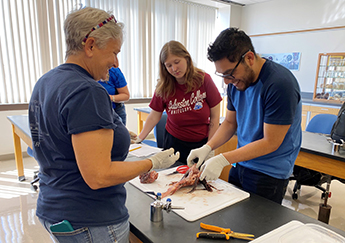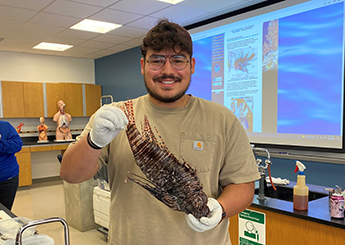Galveston College STEM Discovery Seminar students had the rare opportunity to conduct lionfish dissections early in the fall 2022 semester in collaboration with the Flower Garden Banks National Marine Sanctuary (FGBNMS).
“This was an incredible learning experience for our students to work alongside the scientists from the Flower Garden Banks National Marine Sanctuary,” said Galveston College Title V and National Science Foundation Hispanic Serving Institution Transformation Project Director, Sandra Metoyer, Ph.D. “It was a rare opportunity for our students to dissect the invasive lionfish, which were removed from the sanctuary in an effort to better understand the effects of this invasive species on native fish communities and habitats in the sanctuary.”
Lionfish, an invasive and venomous species native to the Indo-Pacific and Red Sea, are the first invasive species of fish to establish themselves in the Western Atlantic, according to the FGBNMS website. Lionfish can cause significant impacts to local fish populations, and have been documented to eat over 100 species of fish and invertebrates, including commercially important species such as snapper and grouper.
The FGBNMS is one of 15 national marine sanctuaries and two marine national monuments protected by NOAA’s Office of National Marine Sanctuaries, and the only site located in the Gulf of Mexico, 80-125 miles off the coasts of Texas and Louisiana, according to their website.
The lionfish the GC STEM Discovery Seminar students dissected were removed from the sanctuary by 20 volunteer divers and 10 research partners from Florida, Texas, Louisiana, Washington, Maryland, Georgia, New York, and Dominica during the FGBNMS’ seventh Lionfish Invitational, a scientific effort to document the invasive lionfish situation in the sanctuary and remove as many as possible at the same time, in late June 2022 aboard the M/V FLING.
 |
 |
The dive group removed 84 invasive lionfish from Stetson Bank, 26 from East Flower Garden Bank, and 118 from West Flower Garden Bank, for a total of 228. A new Texas state record was recorded for the largest lionfish (17.5 in/445 mm), which was removed from Stetson Bank.
The removed lionfish are examined, including those dissected by GC’s students, for growth data and stomach contents to see which kind and how many native fish species lionfish are eating.
For more information about Science, Technology, Engineering and Math programs at Galveston College, visit https://gc.edu/academic-career-programs/science-technology-engineering-math/index.php or call 409-944-4242.
Registration for the spring 2023 semester is currently underway. Classes begin Jan. 17.
ABOUT GALVESTON COLLEGE
Galveston College was founded in 1967 and is a comprehensive community college providing the residents of Galveston Island and the surrounding region with academic, workforce development, continuing education and community service programs.
